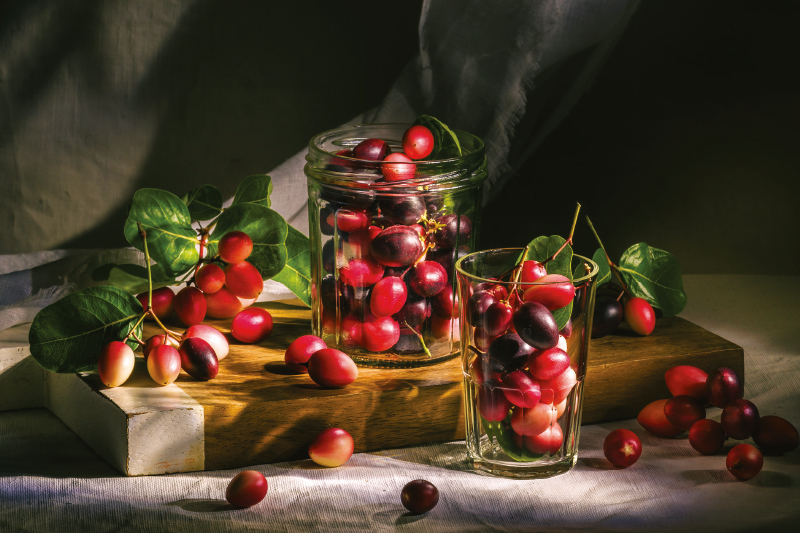
The Fruit That Yawns and Goes Boo
The Bengal currant has the strangest name in Thai, but its fabled health-giving powers are back in fashion
Words: Ariya Chaiyarit
Photo & Style: Samatcha Apaisuwan
The bright pink, berry-sized Bengal currant (Carissa carandas) has a very odd name in Thai – mamuang hao manao ho, which means “mango yawning, lemon booing”. The comparison with lemons and mangos may come from the berry’s sour taste when it’s unripe and sweetness when it ripens.
The Bengal currant has mystical qualities in Thai culture, as recorded in the Ramakien (Ramayana) and the folktale of “Sung Thong, the Prince of the Golden Conch Shell”. However, the fruit plays an even bigger role in the legend of “The Twelve Sisters” or Nang Sip Song. In this story, the currant has magical powers to heal any disease.
This fabled power may have some basis in truth. The Bengal currant is widely used in Indian traditional Ayurvedic medicine. The fruit, leaves and roots of the currant are used to treat acidity, indigestion, fresh and infected wounds, skin disease, cough, stomach ache, anorexia, and diarrhoea, to name a few. It is rich in iron, vitamins C and A, calcium and phosphorus. It comes packed with antioxidants, too, which help reduce the risk of heart disease, some cancers and slow cell damage caused by free radicals.
The berry tastes sour and slightly bitter when unripe, but gets sweeter as it ripens. Apart from being eaten fresh, the Bengal currant stars in savoury dishes like spicy Thai salads. It is also pickled in syrup, dried and rolled into sheets, preserved as jam and jelly, or turned into juice and wine. Other uses include as a flavouring for cookies, crêpes and ice cream.
The fruit grows freely in tropical climes, especially South Asian countries like India, Nepal, Sri Lanka, Pakistan, Afghanistan and Bangladesh.
Though the health benefits of the Bengal currant used to be overlooked and its thorny tree uprooted, its unique name now seems to have caught people’s imagination and the “yawning mango and booing lemon” has become trendy again.
